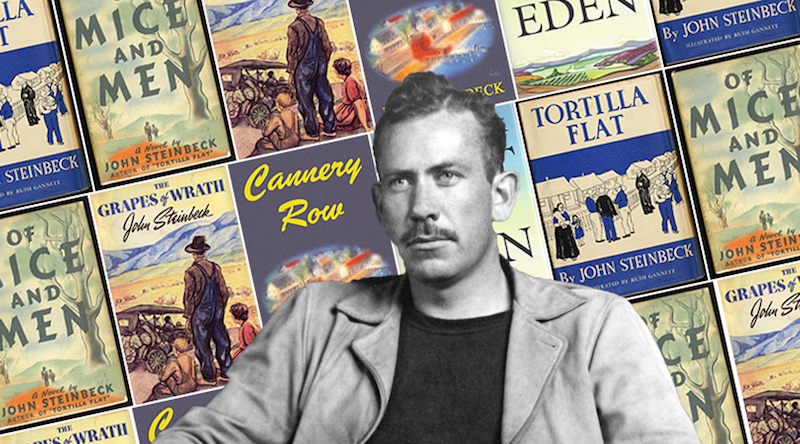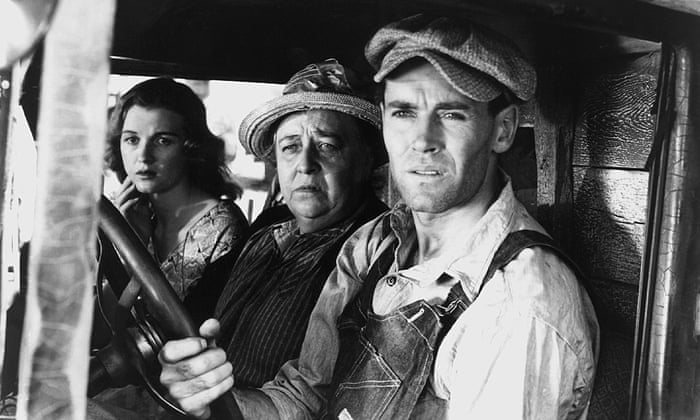




On May 6, 1940, John Steinbeck is awarded the Pulitzer Prize for his novel The Grapes of Wrath.
The book traces the fictional Joad family of Oklahoma as they lose their family farm and move to California in search of a better life. They encounter only more difficulties and a downward slide into poverty. The book combines simple, plain-spoken language and compelling plot with rich description. One of Steinbeck’s most effective works of social commentary, the novel also won the National Book Award.
Like The Grapes of Wrath, much of Steinbeck’s work dealt with his native state of California. He was born and raised in the Salinas Valley, where his father was a county official and his mother a former schoolteacher. Steinbeck was a good student and president of his senior class in high school. He attended Stanford intermittently between 1920 and 1925, then moved to New York City, where he worked as a manual laborer and a journalist while writing stories and novels. His first two novels were not successful.
He married and moved to Pacific Grove in 1930, where his father gave him a house and a small income while he continued to write. His third novel, Tortilla Flat (1935), was a critical and financial success, as were his subsequent novels In Dubious Battle (1935) and Of Mice and Men (1937), both of which offered social commentaries on injustices of various types. His work after World War II, including Cannery Row and The Pearl, continued to offer social criticism but became more sentimental. Steinbeck tried his hand at movie scripts in the 1940s, writing such successful films as Forgotten Village (1941) and Viva Zapata (1952). He also took up the serious study of marine biology and published a nonfiction book, The Sea of Cortez, in 1941. His book Travels with Charlie describes his trek across the U.S. in a camper truck with his poodle, Charlie, and his encounters with a fragmented America. Steinbeck won the Nobel Prize in 1962 and died in New York in 1968.
It is my sincere desire to provide readers of this site with the best unbiased information available, and a forum where it can be discussed openly, as our Founders intended. But it is not easy nor inexpensive to do so, especially when those who wish to prevent us from making the truth known, attack us without mercy on all fronts on a daily basis. So each time you visit the site, I would ask that you consider the value that you receive and have received from The Burning Platform and the community of which you are a vital part. I can't do it all alone, and I need your help and support to keep it alive. Please consider contributing an amount commensurate to the value that you receive from this site and community, or even by becoming a sustaining supporter through periodic contributions. [Burning Platform LLC - PO Box 1520 Kulpsville, PA 19443] or Paypal
-----------------------------------------------------
To donate via Stripe, click here.
-----------------------------------------------------
Use promo code ILMF2, and save up to 66% on all MyPillow purchases. (The Burning Platform benefits when you use this promo code.)





I don’t see what was so great about that film. Besides the fact it promoted FDR’s communism, but hey, what do I know.
Like nearly every commentary about social and economic conditions by socialists or the otherwise uninformed, his novels identified and examined issues, but never bothered to scratch the surface to find a root cause. Of course there is a reason for that. Virtually every problem in every society has either been caused or made far worse by some government action or policy, the exploitation of government power and violence by big business interests or similar, and these folks are generally advocating more government policies to try and fix them.
Exactly.
The Grapes of Wrath is fiction, yet it tells about a time prior to its release of a point in American history, the Dust Bowl years, and its effects. It could be written for today’s america. If there is any commentary it is on how people are resilient, that it is all about family, and how they push on during a period of great dismay, and also how humans can be savage and heartless to others. Right in the middle there is a chapter that talks about how governments hate the average citizen, and do not mind killing them if the chance occurs. It just comes out of nowhere.
Believe me, it is quite a book and has a hell of an ending. In my humble opinion there is no author alive today that comes close to the old timers like Steinbeck. People can not even discuss a book today. Must be the fluoride in the water.
Excellent insight Ginger. My family wasn’t like that which is probably why I missed that. Anyway, Neil Mccoy Ward did an excellent series on the Great Depression. He uses the diaries of people who lived through it. FDR killed millions, mostly starved them to death in the cities. He probably got that idea from Stalin. Here’s a link to Neil’s video’s check them out.
https://www.youtube.com/results?search_query=neil+mccoy+ward+depression+diaries
When Netflix makes the movie about him, will it be called The Apes of Wrath ?
Sorry. I thought it was chuckle worthy.